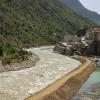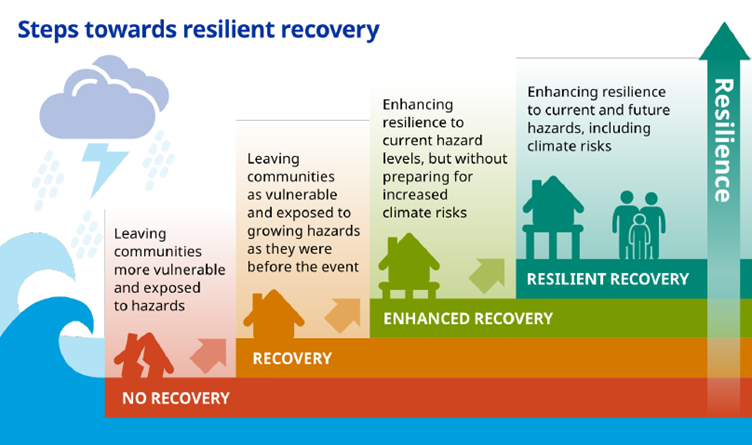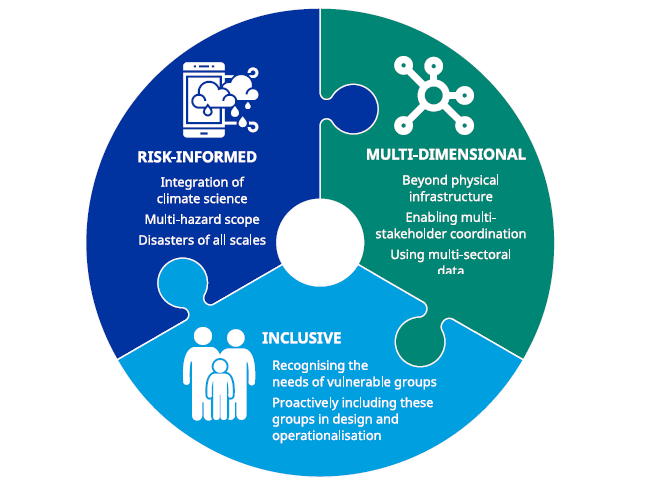
The Zurich Flood Resilience Alliance (ZFRA) — a longstanding partnership IIASA is engaged in — has released its second flagship global report, focusing on ways to improve recovery efforts and help communities better prepare for future climate risks.
Climate change is closely intertwined with disasters, further amplifying their complexity, frequency, and magnitude. The resulting increase in the scale of climate shocks has disproportionate effects on global populations — the ones already vulnerable tend to be the most severely impacted. Moreover, vulnerable populations of disaster-prone countries often tend to end up trapped in a vicious cycle, unable to fully recover and rebuild their lives before the next disaster hits.
"These problems highlight the need for recovery that enhances resilience instead of ‘bouncing back’ or even 'falling back' after a disaster," notes Reinhard Mechler, who leads the Systemic Risk and Resilience Research Group in the IIASA Advancing Systems Analysis Program. "The increasing impact of climate-induced disasters means that communities and governments of at-risk countries need to be prepared before a disaster has occurred — now, more than ever — so decisions are not made in the tumultuous post-disaster period, but are rather agreed in advance with robust, adaptable, and properly-funded plans and strategies already in place."
The Flood Resilience Alliance recently released a new report, titled Towards Transformative Action: The Unfulfilled Promise of Resilient Recovery, which addresses three key questions: What makes recovery resilient? How can national governments plan for and implement resilient recovery? And how can donors and international agencies support resilient recovery?
The report is based on information compiled by the Alliance as part of the Post-Event Review Capabilities (PERCs) – a methodology that has been used for over ten years to review and learn from disasters to build resilience against future events. The resulting set of comprehensive recommendations is focused on one primary goal — to establish the knowledge base, which would help to strengthen recovery efforts and equip communities with the necessary expertise for effective mitigation of climate-induced risks and hazards. Authors provide best practices, which could help both the national governments and the international community to ensure resilient recovery after disasters.
Recommendations for national governments include: establishing multi-sectoral and inclusive coordination mechanisms; developing a comprehensive disaster risk financing strategy to facilitate and implement pre-planned finance; and supporting action at the local level with a clear role for local governments and actors.
Recommendations for the international community include: supporting resilient recovery, as well as increasing grant-financing for resilient recovery at the local level; ensuring that financing does not lead to debt crises (e.g., by providing highly concessional loans and applying climate-resilient debt clauses to existing and new loans); and enhancing cross-sectoral coordination and collaboration.
The report highlights the necessity of enabling a risk-informed, multi-dimensional, and inclusive approach to ensure resilient recovery. An important component of such an approach is to ensure that recovery does not only involve the repair of physical infrastructure, but rather focuses on social, human, natural, financial, and physical dimensions that collectively enhance resilience to climate threats. In addition, the recovery processes must address the needs of all groups of the affected, particularly the most marginalized and vulnerable. Finally, a comprehensive risk management strategy is required to ensure that all of the potential threats and risks are carefully calculated.
Originally launched in 2013 with the goal of shifting focus from flood response and recovery to pre-event risk reduction, the Zurich Flood Resilience Alliance is a global Alliance committed to sharing knowledge for evidence-informed community-based climate resilience.
The Alliance consists of humanitarian, NGO, research, and private sector partners who work together to increase public and private investment in evidence-informed community-based flood resilience. IIASA has been a partner in the Alliance since its inception in 2013.
News

26 July 2024
Navigating new horizons to protect human and planetary health

14 June 2024
IIASA Leadership visits Washington DC

05 June 2024




